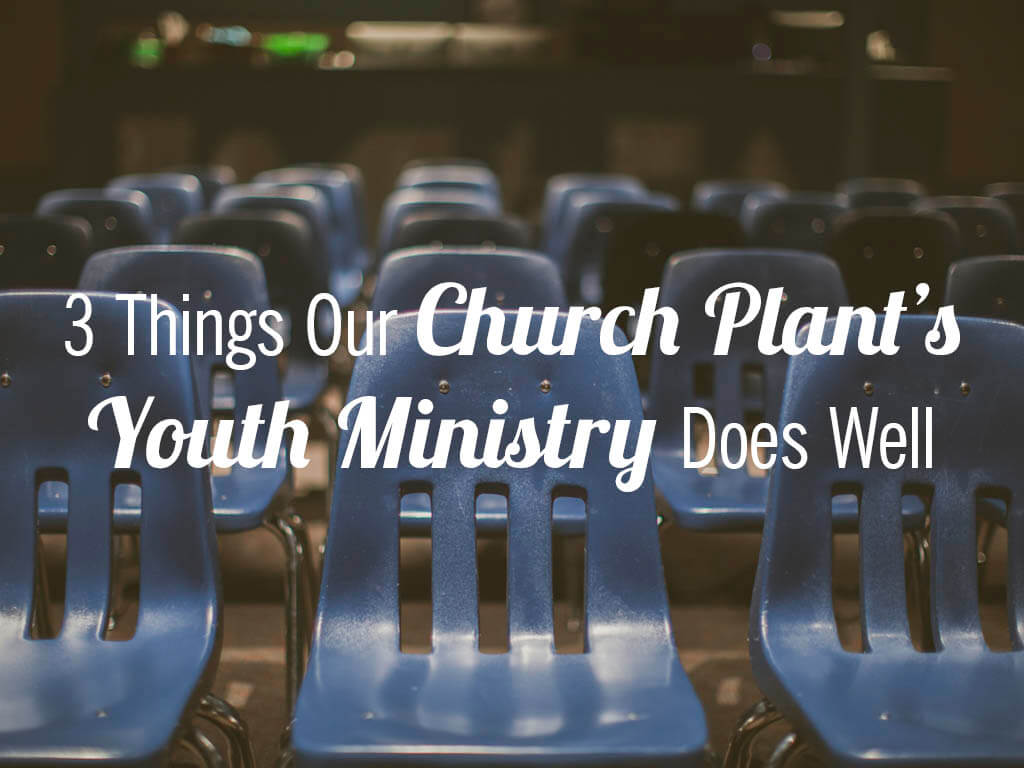After celebrating two years in our church plant, we finally have seven teenagers in our youth group. Our church was started by 30 millennials who wanted to create a new faith community in our town for folks like them—people who didn’t feel safe in a traditional church setting but who desperately wanted to connect with a body of believers on a weekly basis. Even though the majority of our congregants are still millennials (65%), the few families that do have teenagers have jumped on board to help create a youth ministry that fits our non-traditional approach to church.
Here’s a look at a few things that make our situation unique:
We’re a mobile church.
We’ve met in a movie theater, an inter-faith chapel, and we’re currently meeting in a local art gallery. Being a mobile church means we don’t have any form of a youth space—or any space—so we have to get creative about when and where we meet up with our students outside of Sunday mornings.
We integrate all ages into our worship services.
As more families start to come, we’re carefully designing and rethinking our worship space to include entire families. We love hearing the babies, the giggles of the young kids, and the occasional interruption from some of our teens. It also creates some incredible opportunities to plug our youth into volunteer roles in front of the entire congregation. The whole approach is a little messy, but we think the imperfection is worth it if our kids grow up feeling like they belong and have a place to serve in the church.
We’re starting from scratch.
There’s no full-time youth director on our church staff, and we’ve never had programming for teenagers, so we’re really starting from scratch. It’s a tricky spot to be in, but we have room to experiment and to try out new ideas for youth ministry. In the process, our volunteers, our students, and our parents have realized that they need to be hands-on and personally invested in the youth ministry for any part of it to happen. It’s another messy aspect of our church, but it creates a unique sense of ownership in everyone.
3 Things Our Church Plant’s Youth Ministry Does Well
As a church with no building, an intergenerational worship service, and zero youth ministry structure, it would be easy for us to feel overwhelmed by the limitations of our ministry. Instead, we’ve decided to focus on the resources that we do have, which has helped us realize that it is possible for us to build a strong youth ministry in our unique situation. So we’ve narrowed our priorities down to three things that we can do really well:
1) We’re building a relational youth ministry.
Our relational youth ministry structure is built on a foundation of mentorships. Every student has an adult who serves alongside them on Sundays. That means, when we need a game, there’s always an adult and a student leading the game together. Discussion groups have adult and student group leaders. The coffee and donuts are set out by adults and students. Our Sunday morning worship team is a mix of adults and students. Every aspect of Sunday morning involves our youth ministry, even if it’s not a youth only gathering. By integrating students into all areas of leadership, students have 1-2 adults who intentionally use Sunday mornings as an opportunity to get to know them, to encourage them, and then have the chance to build a mentor relationship with them that goes beyond just Sunday mornings.
Our Sunday morning worship team is a mix of adults and students. Every aspect of Sunday morning involves our youth ministry, even if it’s not a youth only gathering. By integrating students into all areas of leadership, students have one to two adults who intentionally use Sunday mornings as an opportunity to get to know them, to encourage them, and then have the chance to build a mentor relationship with them that goes beyond just Sunday mornings.
This type of relational youth ministry works really well in our setting, and it’s a scalable ministry model. As our church grows, there will be more places to serve and more people to help fill these roles. As these students get older, they’ll be given opportunities to lead alongside and train even younger kids. The mentorships we’re building between our adults and students today will be the framework that those students will use as they start to mentor younger kids in the upcoming years.
2) We make the most out of Sunday mornings.
Even with only seven teenagers in our church, it is incredibly difficult to plan anything around their family schedules. So rather than fighting for another night of the week, we’re focusing our youth group time on Sunday mornings before our worship service. We get together twice a month from 9 to 9:45 a.m. to hangout, play some games, and have a youth-only discussion time before we head into our church worship service at 10 a.m. By meeting for 45 minutes twice a month, it doesn’t strain our volunteers and it’s easy for parents since they’re already planning on coming to church. Also, if a student comes to church twice a month—which is average for us—they can have one Sunday to serve and one Sunday to be a part of our youth group time.
3) We take the youth group to our students during the week.
The people in our church are doing lots of amazing things for the gospel in our community. They serving as volunteers in local shelters, they lead community groups that offer safe places for the most vulnerable in our city, they are light and life in their schools, on their sports teams, and in their neighborhoods. So our church has been experimenting with our priorities, programs, and events to make sure they offer the support and encouragement our congregants need to continue to engage in the work God has called them to.
Adding another weekly church event that pulled them away from the good work they were doing—even for something like youth group—seemed to be more of a burden for our families and not necessarily the best kind of support for them. As we were thinking through possible solutions, we had the idea to create a culture that celebrates all the gifts and talents our students express outside of
As we were thinking through possible solutions, we had the idea to create a culture that celebrates all the gifts and talents our students express outside of church. They are crazy talented, athletic, musical, artistic, and have so many other gifts that we just don’t have the time to celebrate on Sunday mornings. So our mid-week youth group activities are focused on the ballgames, the musicals, and recitals that each of our students participate in. We work with the parents to sync up a schedule that includes all of these activities for our students and we make one of them a youth group activity for each week. It’s pretty awesome to know our students are looking out into the stands or into the audience and seeing a group of people from our church cheering them on.
Creating a relational youth ministry, experimenting to fully utilize Sunday mornings, and celebrating all the amazing things our students do outside of church, are three of the ways that we’re experimenting with youth ministry in our church plant. It’s certainly not perfect, but our people own it, students are stepping up as leaders, families are supported, and there’s plenty of room for everyone to grow.




